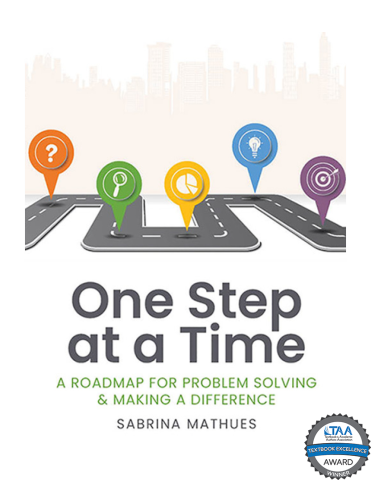Questions? Request Information
UAGC Award-Winning Curriculum
Teaching and Learning with Technology Courses
From mastering digital tools and designing new learning experiences to exploring the ethical use of artificial intelligence in education, this curriculum focuses on workforce readiness to strengthen your ability to adapt, lead, and innovate in every academic setting. By the time you complete your capstone course, you’ll be positioned as a forward-thinking educator prepared to compete with confidence in today’s fast-changing workforce.
To be awarded the Master of Arts in Teaching and Learning with Technology degree, you must complete 30 credits with a 3.0 minimum grade point average.
You may also be able to transfer eligible credits from prior college coursework, military service, professional training or other approved experiences. All transfer credits are subject to UAGC policies and require official transcripts. Once reviewed, approved credits will be applied to your program, helping you save time, reduce costs, and stay focused on building the career-ready skills employers value.
This program is not designed to meet the state educational requirements for teacher licensure or certification in any state. Students seeking teacher licensure shall carefully research their state's requirements prior to enrollment and regularly review the requirements as they are subject to change. Requirements vary by state. Graduates will be subject to additional requirements on a state-by-state basis that will include one or more of the following: student teaching or practicum experience, additional coursework, additional testing, or, if the state requires a specific type of degree, earning an additional degree. None of the University of Arizona Global Campus online education programs are accredited by the Council for the Accreditation of Educator Preparation (CAEP), which is a requirement for certification in some states. Other factors, such as a student’s criminal history, may prevent an applicant from obtaining licensure, certification, or employment in their field of study.
The Online Teaching Support Certification recognizes programs that require all online faculty to undergo training in best practices for online course delivery, provide faculty with ongoing pedagogical support, encourage faculty professional development to increase their knowledge and skill in online teaching, emphasize instructor availability and feedback to learners, and collect and use feedback from learners to improve online teaching. Learn More

The Online Learner Support Certification recognizes programs that provide all the critical student and academic services needed for learner success and use learner feedback to continuously improve those services.

Career Paths with a MATLT Degree
See how your MA in Teaching and Learning with Technology translates into real-world roles. Graduates can pursue opportunities in instructional design, online education, corporate training, curriculum development, and educational technology management. This program equips professionals to create innovative digital learning experiences, implement e-learning systems, and lead training initiatives in academic, business, or nonprofit settings. With the rising demand for skilled online educators and learning designers, career prospects remain strong across industries.
If you earn a Master of Arts in Teaching and Learning with Technology, you may choose to work in industries such as:
- Educational Technology
- Higher Education
- Corporate and Professional Training
- Educational Consulting
- K-12 Education*
*Many roles in K-12 Education require teacher licensure or certification. The Master of Arts in Teaching and Learning is not designed to meet the state educational requirements for teacher licensure or certification in any state. Students seeking teacher licensure shall carefully research their state's requirements prior to enrollment and regularly review the requirements as they are subject to change. Requirements vary by state. Graduates will be subject to additional requirements on a state-by-state basis that will include one or more of the following: student teaching or practicum experience, additional coursework, additional testing, or, if the state requires a specific type of degree, earning an additional degree. None of the University of Arizona Global Campus online education programs are accredited by the Council for the Accreditation of Educator Preparation (CAEP), which is a requirement for certification in some states.


Meet Our Faculty
Teaching and Learning with Technology Faculty & Support
At UAGC, you will be guided by experienced faculty who are committed to your success in teaching and learning with technology. Our instructors bring academic expertise and real-world experience from various sectors and are here to support you on your journey to earning your online master’s degree. With their guidance, you will learn from professionals who will help you develop the knowledge and skills needed to thrive in today’s competitive workforce.
Master of Arts in Teaching and Learning with Technology FAQs
-
With an MA in Teaching and Learning with Technology, you will be ready to lead your institution or organization through a period of rapid change. This workforce-aligned program prepares you for roles that blend education, technology, and innovation, while giving you the leadership skills to guide digital transformation across schools, higher education, and training organizations. With your degree, you may choose to pursue opportunities in instructional design, online education, corporate training, curriculum development, and educational technology management.
-
Yes, an MA in Teaching and Learning with Technology is worth it. Technology is changing the way students learn, and this degree will help you stay competitive, while giving you the tools to take your career to the next level. Beyond building technical expertise, you’ll gain confidence as an innovator and leader who thrives in digital learning environments. To learn more about this occupational field, visit the U.S. Bureau of Labor Statistics.
-
Your Master of Arts in Teaching and Learning with Technology curriculum covers foundations in educational technology, designing technology-enhanced instruction, digital content creation, artificial intelligence in education, leadership and ethics in technology integration, and strategies for online and hybrid learning environments. The program culminates with a capstone course that allows you to apply your skills to a real-world challenge.
-
The Master of Arts in Teaching and Learning is not designed to meet the state educational requirements for teacher licensure or certification in any state.
-
The Master of Arts in Teaching and Learning with Technology is designed to be completed in 64 weeks. Typically, it takes roughly a year and a half to complete a master’s degree in teaching and learning with technology. The University of Arizona Global Campus offers a flexible online format that helps you balance school, work, and family responsibilities. The graduate program is taken one course at a time in 6-week terms, and many students can accelerate their path to graduation by transferring eligible college or prior learning credits. By moving at a pace that fits your goals, you can earn a career-ready degree and apply what you learn today.
Other Degrees That May Interest You
You’ll find degree programs that suit a variety of interests and may enhance a wide scope of career opportunities at UAGC. Explore similar programs to find the right path for you.








